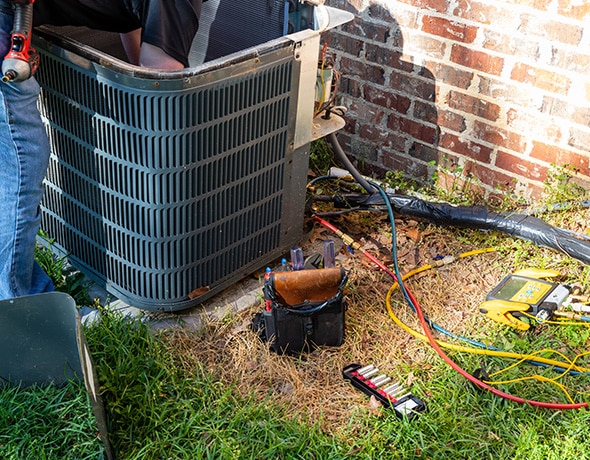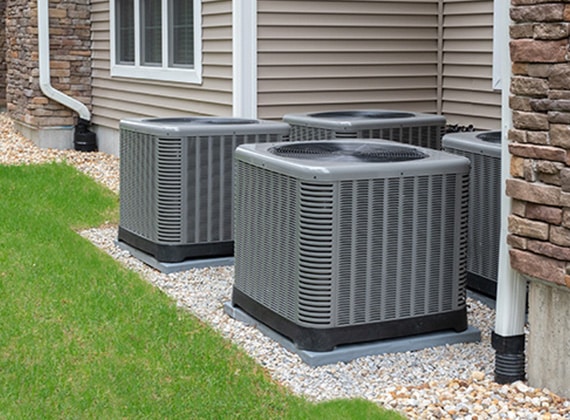Air Conditioning Repair
When should you have your air conditioning (AC) unit repaired? You should repair your AC system as soon as you notice any issues with its performance or operation. Some signs that your AC may need repairs include:

- Reduced cooling: If your AC is no longer providing the same level of cooling as it used to, it may be due to a faulty compressor, refrigerant leak, or other issues.
- Strange noises: If you hear strange noises such as grinding, rattling, or squealing from your AC, it may be a sign of a malfunctioning fan or motor.
- Bad odors: If you notice a bad smell coming from your AC, it may indicate a problem with the system’s drainage or mold growth.
- High energy bills: If your energy bills have increased significantly without any corresponding increase in usage, it may be due to an inefficient or malfunctioning AC.
- Poor airflow: If your AC blows out weak or hot air, it may be due to a clogged air filter or a faulty compressor.
If you notice any of these signs or other issues with your AC, it’s best to have it inspected and repaired by a qualified HVAC technician at ABA Heating & Cooling. Regular maintenance can also help prevent the need for major repairs and prolong the life of your AC. See our Air Conditioning Maintenance page for more information on how our team at ABA Austin can service your AC unit.

Air Conditioning Replacement
Most AC systems are meant to last for up to ten years. Ideally, your unit should be energy-efficient while maintaining comfort in every part of the home. Even with regular maintenance, you may reach a point where your air conditioning system needs to be fixed to keep your home comfortable. Here are a few signs that may indicate that it’s time to replace your central air conditioning system with a new air conditioning unit:
- Age of the AC unit: The average lifespan of an AC unit is around 10-15 years. If your AC is approaching or has exceeded this age, consider replacing it, even if it is still functioning.
- Frequent repairs: If you have to repair your AC frequently, it may be a sign that it’s reaching the end of its lifespan. As the AC gets older, the cost and frequency of repairs tend to increase.
- Poor efficiency: If your AC is no longer energy-efficient, it may be time to upgrade to a newer, more efficient model. Newer models are designed to use less energy, which can lead to significant cost savings over time.
- High energy bills: If your energy bills are much higher than they used to be, it may be due to an inefficient AC system. Replacing it with a newer, more efficient model can help reduce your energy bills.
- Inadequate cooling: If your AC can no longer provide adequate cooling, even after repairs and maintenance, it may be time to consider a replacement.
- R-22 refrigerant phase-out: If your AC unit uses R-22 refrigerant, it may be time to replace it. R-22 is being phased out due to environmental concerns, and it can be difficult and expensive to find and recharge. Many older units still use R-22 refrigerant.
If you are experiencing any of these issues with your AC, it’s best to consult with a qualified HVAC technician at ABA Austin to determine if it’s time to replace the unit.
When to Repair and When to Replace
Whether you should choose to repair or replace your air conditioning (AC) system depends on several factors, including the age and condition of the unit, the cost of repairs versus replacement, and your long-term goals for your home’s comfort and energy efficiency. Here are some things to consider when deciding between AC repair and AC replacement:
- AC repair: Repair may be the most cost-effective option if your AC is relatively new and has only minor issues. If you plan to move soon and don’t want to invest in a new AC, repair may be the more practical option.
- AC replacement: If your AC is over 10-15 years old, replacement may be the best option. Older units become less efficient and require more frequent repairs, making replacement a more cost-effective long-term option.
If you want to improve your home’s energy efficiency and reduce energy bills, replacing your old AC with a newer, more efficient model can help you achieve those goals. Ultimately, deciding to repair or replace your AC will depend on your circumstances and budget. It’s always a good idea to consult a qualified HVAC technician at ABA Heating and Cooling in Austin for a professional opinion on which option is best for you.

